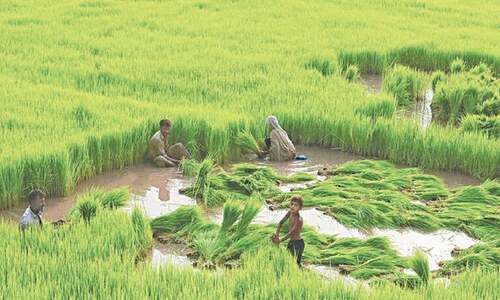
Feeding Asia in the 21st century will require a second Green Revolution. However, unlike in the first generation, future yield increases will have to come from crop varieties using less water and nitrogen in view of global climate change.
This can only be done by increasing the efficiency of photosynthetic system, i.e. developing a C4 rice plant. If and when achieved, it would be the first non-evolutionary example of reconstructing the primary metabolism of a plant. The impact of such a scientific achievement would be undeniable, but it requires either a superb feat of genetic engineering or forced evolution.
The world population today is about seven billion, and almost half of it depends on rice. The alarming thing is that a billion people live on less than a dollar a day and spend half of their income on food, 854 million people are hungry and each day about 25,000 people die from hunger-related causes.
At present when elite rice cultivars, which dominate the food supplies of millions of poor people in Asia, have approached a yield barrier, plant breeding seems to have exploited all of the intrinsic high yield-linked genes. Insufficient yield of rice produces food insecurity and social unrest. The C4 Rice raises hope that threats to food security will be tackled.
The C4 is a cutting edge science. Different consortia in more than ten countries are working in this context to change C3 plants to C4 with the basic strategy, underlining idea is to discover the genes, generate a model plant and then introduce C4 photosynthesis into widely used cultivars. An approximate guess is that 50 per cent yield will be increased after introducing C4ness in rice.
Pakistan is the sixth most populous country and its graph of poverty is rising due to rocketing food prices. Being agro-based, bulk of the country’s population is linked directly or indirectly with agriculture. It has all the favourable conditions of soils, irrigation water and climate but it is a net importer of food grains.
Growing rice countrywide, Pakistan has added advantage of world renowned Kallar Tract (a bowl-shaped region) that has further premium over Basmati from other regions. In this scenario, when the average rice yield in most countries is more than ten tons/hectare, it is still stuck up on 2-3 tons/hectare (Economic Survey of Pakistan, 2011). The gap between actual and potential yield has to be bridged.
There is a long list of factors for this low productivity, but the focus here is on the research wing. The country will have to change its research patterns. It has to catch up with the new horizons and methodologies of research going worldwide. I would like to correlate the rice research in Pakistan with C4 rice research that is an emerging integrated type of research funded by Bill & Mellinda Gates foundation, simultaneously going in different parts of world and headed by one centre.
Pakistan, having the best Basmati rice should be a part of this global research, sharing the latest views and writings, huge funding from the project, active utilisation of scientific potential, technical staff opportunities etc. If the world will succeeds in creating a C4 rice strain, Pakistan will be benefit accordingly.
The writer is PhD research scholar at International Rice Research Institute, Los Banos, Philippines.
e-mail:z.hasnain@irri.org














































Dear visitor, the comments section is undergoing an overhaul and will return soon.